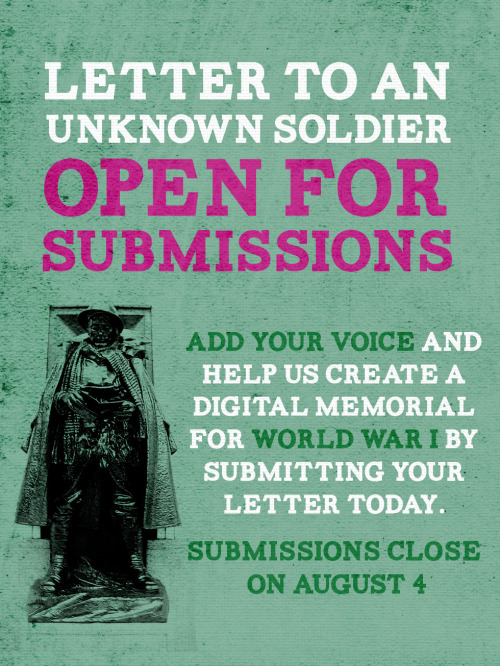 August
is a strange month to be sitting in a locked room. Curtains closed to
keep the blaze of sunshine from the obscuring the computer's glare.
Half-starving, shivering in trenches (imaginatively) whist outside
summer burgeons and allotments fatten. But I was excited to be
leading my first digital writing residence and for seven days, it
felt as if the flickering screen was my patch of sky. When I wasn't
googling research sites, jotting exercises or tweeting about it, I
was waiting for the cheep of e-borne post. The residency was
commissioned by WritingEast Midlands
in conjunction with a national body responsible for organising
suitable cultural commemorations of WW1. Someone in 14-18-NOW
had the idea of a unique 'memorial
of words'
from today's generation and nationwide, schoolchildren, pensioners,
squaddies and civilians, writers and other artists, were drafted to
pen a Letter tothe Unknown Soldier
of Paddington Station.
August
is a strange month to be sitting in a locked room. Curtains closed to
keep the blaze of sunshine from the obscuring the computer's glare.
Half-starving, shivering in trenches (imaginatively) whist outside
summer burgeons and allotments fatten. But I was excited to be
leading my first digital writing residence and for seven days, it
felt as if the flickering screen was my patch of sky. When I wasn't
googling research sites, jotting exercises or tweeting about it, I
was waiting for the cheep of e-borne post. The residency was
commissioned by WritingEast Midlands
in conjunction with a national body responsible for organising
suitable cultural commemorations of WW1. Someone in 14-18-NOW
had the idea of a unique 'memorial
of words'
from today's generation and nationwide, schoolchildren, pensioners,
squaddies and civilians, writers and other artists, were drafted to
pen a Letter tothe Unknown Soldier
of Paddington Station.
He's
an approachable soul. When you get above the height of the marble
plinth, he looks like an ordinary young man from your street. In the
bulky uniform of a WW1 Private, he wears a voluminous greatcoat and a
non-regulation knitted scarf. He is reading a letter and the
14-18-NOW project invited us to write that Letter
From Home.
But we had seven days to play with so I devised exercises each day on
themes around the Paddington statue - or 'our
friend Tommy'
as we came to call him. Moving through reflections on the STATION,
BOOTS, LETTER, HELMET, SCARF, GREATCOAT and MEMORIAL, we edged
further and further into his nightmarish world of troop trains,
trenches, shell-holes. It was impossible not to be disturbed,
horrified and deeply saddened at the industrial slaughter and daily
privations these Tommies suffered.
For
me, the experience was lightened by the beautiful writing and
enthusiastic engagement of the week's work-shoppers. As it turned
out, these included some experienced writers, already knowledgeable
about WW1. Each day along with writing prompts and exercises, I
posted videos, images and web-links garnered from a wide range of
on-line sources. We explored the WW1 'field' postal depots and a
French cottage industry producing silk embroidered postcards on a huge scale for
soldiers to send home. We wrote about trench foot and shell-shock,
about Boy Soldiers (Britain's 250,000 underage recruits) and dawn
executions. My 'posties' delivered witty, insightful and moving
accounts of desert bombing raids, 'Munitionettes' and life on the
Home Front too. After all, this 'Total War' not only spanned the
globe but revolutionised social and gender relations as well as the
technology of killing human beings in unforeseen numbers.
A
century on, a digital writing course is probably a fitting venture
for 2014. The unpredictability of who and when was a challenge for me
but the flexibility was appealing to workshoppers. With open access
24/7, they could pick through which of the resources and exercises
they wanted to tackle and post when they were ready. An attempt at
'live
workshops' faltered
– it proved better for people to work at their own pace. But they
could share the 'texts' they produced – poems, stories, dialogue
fragments – and converse with each other via forumthreads.
I critiqued each piece posted but also found their feedback
invaluable on my own attempts at exercises. So fruitful was this,
that subsequently I have drafted a dozen 'Unknown Soldier' poems.
An unexpected bonus.
When
we emerged blinking from this digital dug-out, it was the 4th
August. We were posting our final Letters just as the nation marked
the 100thanniversary of the War declaration.
A sobering moment. But also the culmination of a week's creativity,
exploring our own responses to war, and imaginatively re-entering
that charged landscape of the past. I am grateful to WEM for the
opportunity and to my 'posties' for their openness to writing
challenges, their willingness to venture into some dark places and
their companionship. I hope we shall see more of their WW1 writing
but you can read their Letters to 'our friend Tommy' along with
21,408 others on the 14-18-NOWUnknown Soldier website.
They will be available to read there until 2018 when they will be
stored permanently in the British
Library's
digital archive. At which point, our voices and letters will merge into that polyphonic postbag that is our own 'history'.



No comments:
Post a Comment